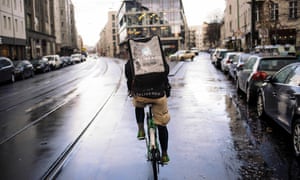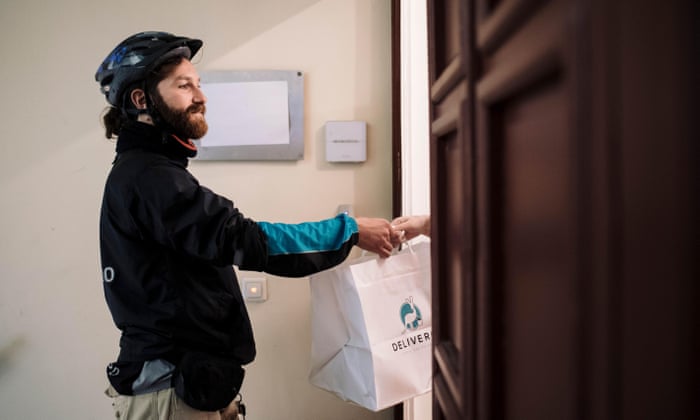The truth about working for Deliveroo, Uber and the on-demand economy
Drivers, couriers, cleaners and handymen are now at your beck and call thanks to a host of apps. But what’s it like to earn your living waiting for someone else to press a button?
 A Deliveroo rider. Photograph: Alamy
A Deliveroo rider. Photograph: Alamy
Wednesday 15 June 201612.46 EDTLast modified on Thursday 16 June 201608.12 EDT
It’s the simplicity that is so seductive. Thanks to apps such as Uber or Handy, in a few clicks you can be whisked home by a private driver, to a spotlessly cleaned flat, where your favourite meal is brought to your door. So perhaps it’s no surprise that Deliveroo, the company that delivers restaurant food to your door, is expecting to hit revenues of £130m this year. While every week in London alone, 30,000 people download Uber and book a car for the first time, thefirm now valued at $62.5bn.
Supporters argue that this “on demand” economy offers those who choose to work for them the independence and flexibility to fit their work to their lifestyle, or supplement their income from another job. Uber’s UK chief, Jo Bertram, points out: “Over two-thirds of new people signing up to drive with Uber have been referred by an existing partner-driver because they love the freedom and flexibility.” While Deliveroo say they have more than 3,000 riders in the UK – a number that is rising weekly.
But maybe it’s not as simple as it seems: strikes and class actions by workers in the on-demand economy, along with government restrictions, seem to be popping up as quickly as new apps. So what is it really like working in the on-demand world? We asked four people about their experience.

‘It’s not flexible and there’s no sick pay’ … a Deliveroo rider delivers someone’s dinner. Photograph: Gregor Fischer/DPA Germany
“I had to deliver a single crepe to a City worker’s desk”
Tom*, 24, Deliveroo cycle courier, London
Tom*, 24, Deliveroo cycle courier, London
I was working in a bar when a friend of mine started working for Deliveroo. I was sick of working until 2am and I really like cycling so I decided to join too. I wanted as many hours as possible, but cycle couriers mainly do a three-hour shift at lunchtime and three hours in the evening, because those are the busiest times for Deliveroo.
We pick up anywhere from Nandos to [Argentinian steak restaurant] Gaucho. Sometimes it is street food vans. It can be alienating – for example, if you are picking something up from a restaurant because someone is too lazy to walk a minute down the road. Once I was paid to pick up a single Nutella crepe from a restaurant and deliver it right to someone’s desk in the City of London. At times like that you think: what am I doing? That this is like late capitalism.
Some customers tell you to keep safe or worry about you riding at night, but mostly people just take their food and don’t say anything.
The most money I have ever made in one go is when I did 11 deliveries in a three-hour shift. Deliveroo pay £7 an hour, and then £1 per delivery – so that was £32. But that’s rare – more often I do three drops in three hours. Customers don’t tip – or rarely, because there is no cash transaction [payment is by card on the Deliveroo app]. A lot of my colleagues travel in from other parts of London so they can’t go home between the two shifts – they are essentially sacrificing 10 hours a day but only being paid for six. [Deliveroo says that its riders work within a radius of a few kilometres and they can choose to work in their own neighbourhoods.]
We are employed as “independent contractors” but that’s just ridiculous legal mumbo-jumbo, to allow the company to duck its responsibilities. It’s not flexible either. We used to have a system where you could swap shifts with people but they said it was too chaotic. Now you do the same shifts every week. [Deliveroo says that while work sessions are booked in advance in London, its riders prioritise flexibility and are free to tell Deliveroo when they wish to work and for how long. They say this flexibility would be lost if riders had to fit into the current structures for employees, resulting in benefits such as sick pay.]
If you get knocked off your bike there is no sick pay, and the company has no responsibility to give you any work afterwards. I am in the Independent Workers Union of Great Britain and they are affiliated to the London Courier Emergency Fund – they will help you if you get injured, because your company won’t. [Deliveroo says riders engage with it flexibly as freelancers, saying when they want to work. This means they are responsible for their own insurance – but the company is looking into new approaches with insurers].
I think Deliveroo want to manufacture this image that we are all young, middle-class men who wear trendy clothes, making a little extra cash. But a lot of the couriers are migrants, or working-class people from the local area, and the majority are doing it full- time because they need the money. There are all ages – from 18 to people in their 50s. [Deliveroo says this is not reflective of its fleet and that around 85% of riders use the app to supplement their income.] If there aren’t enough orders in their area, then people get their shifts cut. I don’t know how long Deliveroo can keep its image as a cool tech startup.
Why am I still here? I like cycling a lot. And what else can I do? I don’t have qualifications. Now at least I have regular hours. And I am interested in the union. Deliveroo riders are getting organised and we are trying to challenge the idea we are independent contractors and fighting for an independent wage.
‘For some of the cleaners – mostly women – it worked out well.’ Photograph: Alamy Stock Photo
“Cleaners would call from customers’ houses saying they were being shouted at”
Jo*, 25, ex customer services, Handy.com, London
Jo*, 25, ex customer services, Handy.com, London
I worked for Handy [an on-demand odd-job app] for about a year. The cleaners were classified as self-employed to save costs for us, and the customer. The benefits for the cleaners is that they can choose their hours and jobs. But there are obstacles – customers don’t always understand that the cleaners don’t work for us – and the customers paid in advance. We would vet and do background checks. If someone is self-employed, you can’t tell them to wear a uniform, but we would give them a T-shirt and say we would like them them to wear it. We did give some support in how to register as self-employed.
Working on customer services we had to deal with customers if cleaners didn’t turn up. At first the cleaners got three chances and were then fired. But later they changed it and started fining cleaners – I didn’t think that was fair. [Handy says both the customers and professionals are sent multiple prompts to remind them of the booking and easy-cancellation options.] Sometimes things got iffy – cleaners calling up from customers’ houses, saying they were being shouted at or being verbally abused. We would advise them to leave or call the police if it was really bad.
For some of the cleaners – who were mostly women – it worked out well. Sometimes they were mothers who just wanted a bit of extra money. Or there would be superstar cleaners, often from eastern Europe, who would work incredibly hard for a few months – 10 or 12 hours a day. They would take home £2,000 a month, then go back to their home country. Some customers were really happy with the job and would ask for the same cleaner each time.
Most of the cleaners seemed to be migrant women who did not speak much English. They earned around £8.50 an hour. If they were long jobs, it was good, but many were just a few hours. And travelling around London could be expensive if there were no jobs in your local area.
Occasionally we would blacklist customers. There was one case that was really bad – the husband was being weird with the cleaner, staring at her and following her round, trying to touch her. Obviously we told her not to go back but he started calling her. We had to ring him and tell him to stop. [In a statement, Handy says: “The success, health and safety of our professionals is a top priority, and we have a robust set of procedures in place to ensure that professionals have the support they need.”]
When I started there was a team of 30 people in my team, but it slowly crumbled. Then a week before Christmas they sacked almost everyone. I think they have streamlined everything and there are around only four people on the team now.

‘It was good for about six months – but then then they dropped the fees’ … former Uber driver Nadeem Iqbal. Photograph: Christopher Thomond for the Guardian
“With Uber, you’re on your own. You’re supposed to email and wait for a reply”
Nadeem Iqbal, 35, former Uber driver, Bradford
Nadeem Iqbal, 35, former Uber driver, Bradford
I worked for Uber a year ago but left two months ago. I have been a taxi driver for 10 years in total. I worked for a private firm, but was one of the handful who joined when it first came to Bradford. I was happy with my private hire, but I wanted to try the new technology. It turns out there are a lot of flaws.
It was good for about six months, but then I went on holiday and by the time I came back it had dropped the fees from £1.30 a mile and 15p a minute to £1 a mile and 10p a minute [with a minimum fare of £2.50]. There were more drivers, too. Once you minus your expenses, it worked out at about 30p a mile. Originally I was earning up to £600 a week but when they dropped the prices it almost halved – you had to do 80 hours, for the same amount of money. It compromises passenger safety. It says you are partners, but it dictates to you like you are an employee – you don’t control your own working conditions. [Uber disputes this, pointing out that drivers can decide when, where and how long to drive for. They can also drive with other operators.]
When I started, I highlighted driver safety. One of the reasons I liked the idea of Uber was that you weren’t carrying cash. If you work from a traditional base if you get in trouble with a customer there is a system in place; you shout out a code so the operator knows you are in trouble. And your operator knows where you are so they will send other drivers to help – or at least check whether you are alive or dead. With Uber you are on your own; you are supposed to email them and wait for a reply. [Uber say drivers can contact our response team 24/7 through the Uber app. If there is a serious incident, the driver should always call the emergency services first.]
I am a representative for the United Private Hire Drivers union and weprotested all over the place – in Leeds and Manchester. Around 400 drivers have left Uber in Yorkshire because they don’t look after them. We are setting up a drivers’ co-operative instead.

‘There can be culture clashes when people think things are acceptable and I don’t.’ Photograph: Franek Strzeszewski/Getty Images/Cultura RF
“My first guest used my white towels when dyeing her hair”
Mike Broadbridge, 25, Airbnb landlord, Geneva
Mike Broadbridge, 25, Airbnb landlord, Geneva
Advertisement
When I started my business I moved into my parents’ apartment and started renting out my own on Airbnb. I wanted to keep it, and renting it on Airbnb covers the rent. I began six months ago after a friend started using it and said he would never pay for a hotel again after using Airbnb, because you get a whole apartment, not just a room.
Generally, it’s been a good experience – I like straightforward transactions rather than people who stick around and waffle. I have had a steady stream of bookings – the apartment is near the airport and the train station and the Palace of Nations, so UN employees come quite often. I have met some really nice people through it.
There can be culture clashes when people think things are acceptable and I don’t. I had a Japanese guest, who was very polite as you would expect – but he told me very late on that he wasn’t arriving until 11pm on a Saturday night – the night of the Champion’s League final. I wasn’t best pleased.
My first guest wasn’t the easiest. First, she wanted to check out very early. That was fine but because she was my first guest I wanted to collect the keys personally so tried to arrange to meet her. She wasn’t willing to do that so decided to check out the day before – she handed the keys over, then tried to get the day’s money back. Afterwards I found out she had used my white towels when dyeing her hair – all my white towels were covered in horrible brown stains.

No comments:
Post a Comment